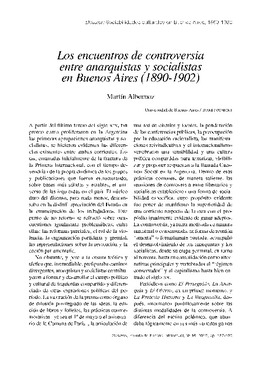Los encuentros de controversia entre anarquistas y socialistas en Buenos Aires (1890-1902)
The controversy encounters between anarchists and socialists in Buenos Aires (1890-1902)
Abstract
A partir del último tercio del siglo XIX , tan pronto como proliferaron en la Argentina las primeras agrupaciones anarquistas y socialistas, se hicieron evidentes las diferencias existentes entre ambas corrientes. Estas emanadas inicialmente de la fractura de la Primera Internacional, con el tiempo devendrían de la propia dinámica de los grupos y publicaciones que fueron estructurando, sobre bases más sólidas y estables, el universo de las izquierdas en el país. El núcleo duro del disenso, para nada menor, descansaba en la disímil apreciación del Estado en la emancipación de los trabajadores. Este punto de no retorno se refracto sobre otras cuestiones igualmente problemáticas, entre ellas: las reformas parciales, el rol de la violencia, la organización partidaria y gremial, las representaciones sobre la revolución y la acción parlamentaria. From the last third of the nineteenth century, as soon as the first anarchist and socialist groups proliferated in Argentina, the differences between the two currents became evident. These emanated initially from the fracture of the First International, with time they would become the dynamics of the groups and publications that were structuring, on more solid and stable bases, the universe of the left in the country. The hard core of dissent, for nothing less, rested on the dissimilar appreciation of the State in the emancipation of workers. This point of no return was refracted on other equally problematic issues, including: partial reforms, the role of violence, party and union organization, representations about the revolution and parliamentary action.

